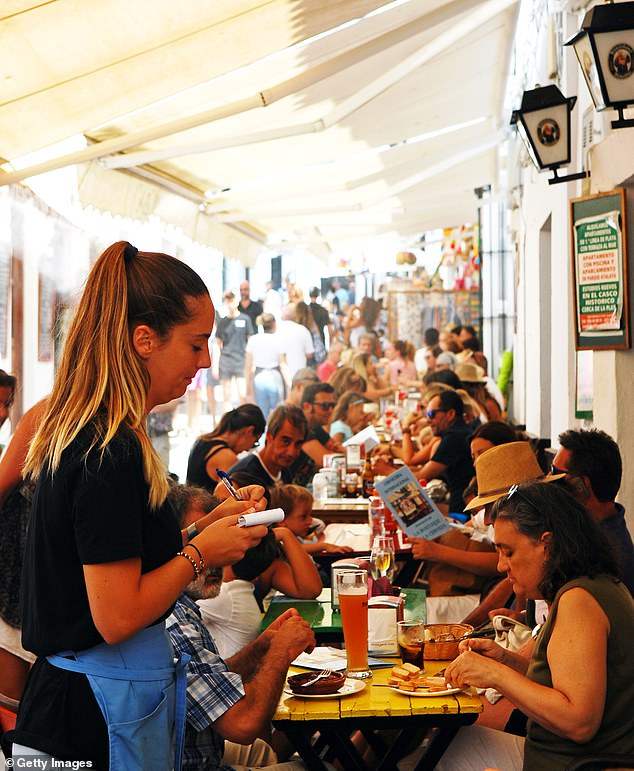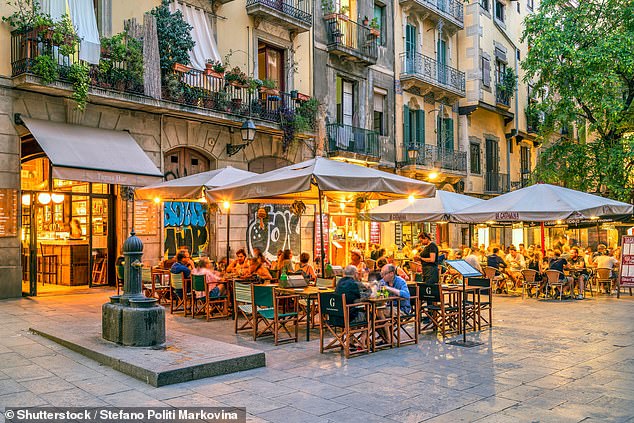Spain has passed a controversial new law allowing restaurateurs to charge extra for customers who sit in the shade in one of the country’s hottest provinces.
The Junta de Andalucia, in the arid south of the country, has decided that establishments can set different prices for tables depending on whether they are exposed to sun or shade, under certain conditions.
Ruben Sánchez, spokesman for consumer association Facua, said bars, cafes and restaurants will be able to charge more as long as they clearly announce the higher price.
But there will be limits to how much homeowners can charge for a patio table, avoiding exorbitant add-ons, as reported The Olive Press.
Restaurants and bars will still not be able to charge more for a specific view and could face “reporting and sanctions” if they do not follow the rules.

The file photo shows a waitress taking an order from a pad on the terrace of a tapas bar in Conil de la Frontera, near Cádiz, during a busy lunch hour.
Under the new rules, any price changes must be “clearly visible”.
Verbally informing a customer of the additional charges would not be enough to satisfy the new conditions – and owners could be penalized if they made a mistake.
Sanchez said the new rules will also mean customers will no longer be forced to pay for bottled water, as tap water should be available.
Andalusia, the south of Spain, frequently experiences scorching temperatures across the region.
In 2021, the city of Córdoba recorded a record 47.6°C.
The changes come amid a campaign for new laws to change customs and protect workers’ rights in Spain’s key hospitality sector.
Earlier this month, Spanish politicians proposed controversial new rules that could lead to the early closure of Spanish bars and restaurants, in a bid to better “structure” Spanish society.
Yolanda Díaz, the country’s Minister of Employment and Social Economy, told the Spanish Congress: “A country that opens its restaurants at one in the morning is not reasonable.
“It’s crazy to try to keep extending hours until I don’t know what time.”
This is part of a broader attempt by Díaz’s party, Movimiento Sumar, to introduce new protections for workers in the tourism and hospitality sector, by imposing limits on working hours, reduced opening hours and early closures.
But the move has been criticized by owners and politicians who argue that longer opening hours are an essential part of what punters expect – and what venues rely on to survive.
Isabel Díaz Ayuso, president of the Community of Madrid, commented on a video of Díaz’s speech on X, formerly Twitter: “Spain has the best nightlife in the world, with streets full of life and freedom. And it also creates jobs.
“They want us to be puritans, materialists, socialists, without soul, without light and without restaurants because they want to. I’m bored and I’m at home.
The Madrid tourist office then sharing that the number of international tourists in Madrid increased by 17.5 percent in January, generating more than a billion euros in spending.
“The region thus records the best data of the entire historical series in terms of expenditure and the second in terms of arrivals in January.”
Last year, Spain also introduced a list of new bans explicitly aimed at travelers planning to visit the country.
This included being able to prove that you had enough money to support yourself for the entire trip – if you were coming from a country outside the European Union.


File photo shows an open-air tapas restaurant with parasols in Barcelona, Catalonia
Smoking has also been banned on a number of beaches, following policies introduced in Barcelona in 2022.
Violators in affected communities may face a fine if caught smoking a cigarette by the sea.
Drinking limits have also been introduced at all-inclusive hotels in tourist hotspots Magaluf, El Arenal, Playa de Palma in Majorca and Sant Antoni in Ibiza, in a bid to crack down on reckless drunken behaviour.
In 2022, the Balearic island of Mallorca also introduced a dress code banning strapless tank tops, swimsuits, football kits and accessories bought from street vendors (like gold chains and shiny hats). in the dark) in bars and restaurants.
Hotspot areas like Barcelona and Alicante have also introduced new noise laws, threatening fines of up to 300,000 euros for disrupting the atmosphere.

